|
|
|
Sort Order |
|
|
|
Items / Page
|
|
|
|
|
|
|
| Srl | Item |
| 1 |
ID:
133305
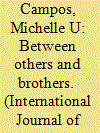

|
|
|
|
|
| Publication |
2014.
|
| Summary/Abstract |
Some fifteen years ago, the Israel Museum exhibition "To the East: Orientalism in the Arts in Israel" featured a photograph by the Israeli artist Meir Gal entitled "Nine Out of Four Hundred: The West and the Rest." At the center of the photograph was Gal, holding the nine pages that dealt with the history of Jews in the Middle East in a textbook of Jewish history used in Israel's education system. As Gal viscerally argued, "these books helped establish a consciousness that the history of the Jewish people took place in Eastern Europe and that Mizrahim have no history worthy of remembering." More damningly, he wrote that "the advent of Zionism and the establishment of the Israeli State drove a wedge between Mizrahim and their origins, and replaced their Jewish-Arab identity with a new Israeli identity based on European ideals as well as hatred of the Arab world."
|
|
|
|
|
|
|
|
|
|
|
|
|
|
|
|
| 2 |
ID:
131856


|
|
|
|
|
| Publication |
2014.
|
| Summary/Abstract |
This article traces the motif of the living-dead in Nathan Alterman's poetry, beginning with Stars Outside and through Ten Plagues of Egypt to The City of the Dove, indicating the way in which Alterman's literary-symbolic structure was gradually replaced by a historical-literary one that reflects the influence of historical events - the two world wars, the Holocaust, and the War of Independence. With the wiping out of Jewish existence and literature, the Jewish hero became the Jewish victim and national symbol who in sacrificing himself ensured the life of the nation.
|
|
|
|
|
|
|
|
|
|
|
|
|
|
|
|
| 3 |
ID:
165231
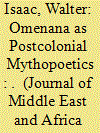

|
|
|
|
|
| Summary/Abstract |
This article is a brief introduction to the writings of Nigerian scholar and writer Remy Ilona. In his work, Ilona argues that an undeniable induction can be made that the Igbo of Nigeria are religio-cultural descendants of the ancient Israelites as depicted in the Hebrew Bible. This article argues that his ideas constitute a postcolonial mythopoesis that is not only cosmic in scope, but also responsive to the social problems engendered by modern slavery and colonialism.
|
|
|
|
|
|
|
|
|
|
|
|
|
|
|
|
| 4 |
ID:
126973
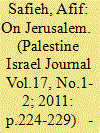

|
|
|
|
|
| Publication |
2011.
|
| Summary/Abstract |
To date, the status of Jerusalem has been determined not by negotiation or demography, but through conquest.
The destiny of Jerusalem is surely totally ties to the fate and destiny of Palestine. The battle that took peace in Palestine throughout the 20th Century, aimed at reducing the majority into a demographic minority and propelling the minority into a demographic majority, that battle was also waged in an around Jerusalem but in an even more acute manner.
|
|
|
|
|
|
|
|
|
|
|
|
|
|
|
|
| 5 |
ID:
188161
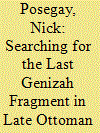

|
|
|
|
|
| Summary/Abstract |
The Cairo Genizah is well known as a repository for hundreds of thousands of manuscripts that the Jewish residents of Fustat (Old Cairo) produced and consumed in the premodern period. Foreign “collectors” acquired most of these manuscripts for European libraries in the second half of the nineteenth century, with the majority arriving at the Cambridge University Library in 1897 under the auspices of Solomon Schechter. Less well known is the fact that hundreds of Genizah fragments were produced in the late nineteenth century, even as European collectors were scouring Cairo for ancient texts. This later corpus includes witnesses to the social and economic history of late Ottoman Cairo and provides copious evidence for the material history of Egyptian Jewish literary activity at that time. Despite this, it remains understudied for both Ottoman and Jewish history. Late Genizah material also raises questions about the integrity of “Cairo Genizah” manuscript collections around the world, as some fragments postdate Schechter's Genizah “discovery,” and others were never in Egypt at all.
|
|
|
|
|
|
|
|
|
|
|
|
|
|
|
|
| 6 |
ID:
133307
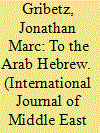

|
|
|
|
|
| Publication |
2014.
|
| Summary/Abstract |
To the Arab Hebrew [la-?ivriyah ha-?arviyah]! If you are a Hebrew, you are not an Arab. If an Arab, not a Hebrew. So, you are neither a Hebrew nor an Arab . . . C.Q.F.D." This paid announcement, published by an anonymous reader of the Jerusalem-based Hebrew newspaper ha-Tsevi on 27 November 1908, reminds us that the idea of an Arab Jew (or, in the parlance of Palestinian Hebrew in the early 20th century, an Arab Hebrew) has been at once present and contested from the early years of Zionist settlement in Palestine. Moreover, the contestation was (as it remains) often more emotional than logical (ce qu'il fallait démontrer notwithstanding). But the category of Arab Hebrew was not constructed simply to be attacked; for some, including another personal advertiser on the very same page of ha-Tsevi, Arab Hebrew was a self-proclaimed identity. "To M. M.," he or she wrote, "I saw you, I knew you, I respected you. I will leave you, I will remember you, and I will not forget you." This mysterious
|
|
|
|
|
|
|
|
|
|
|
|
|
|
|
|
| 7 |
ID:
144670
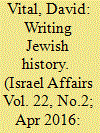

|
|
|
|
|
| Summary/Abstract |
The contemporary proliferation of Jewish studies notwithstanding, the history of the Jews in modern times is still far too widely seen as an offshoot ‒ if not a function ‒ of the history or histories of others. And yet, if their evolving history is to be taken seriously, the Jewish side of things needs to be examined before all else in the light of what the Jews themselves ‒ and most especially their own leaders ‒ did, or failed to do, in the light of what were arguably their own collective interests. And this, most especially, in what deserves to be reckoned the political sphere of things. For while the old fundament of relations between Jews and non-Jews was slow to change, the affairs of the Jews and the trend of opinion among them began to undergo unprecedented change internally. Their mental and material affairs took on an authentically autonomous character. An unprecedented striving for change ‒ limited in some cases, but in others thoroughgoing in its craving for actual self-rule ‒ has come to mark them, albeit incompletely, but in total import ever more strongly; and to set a stamp upon their recent history that has proved to be no less than revolutionary.
|
|
|
|
|
|
|
|
|
|
|
|
|
|
|
|
|
|
|
|
|